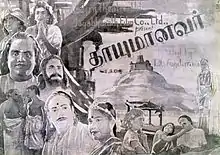Thayumanavar (1938 film)
Thayumanavar is a 1938 Indian Tamil-language film produced and directed by T. R. Sundaram.[2] The film brought to screen the life story of Hindu Saint and Philosopher Thayumanavar who lived in the 18th century. Carnatic Singer and actor M. M. Dandapani Desikar featured in the title role.[3]
| Thayumanavar (1938 film) | |
|---|---|
 Film Poster | |
| Directed by | T. R. Sundaram |
| Produced by | T. R. Sundaram |
| Screenplay by | P. S. Chettiar |
| Story by | P. S. Chettiar |
| Based on | Life story of Thayumanavar, a Hindu Saint and Philosopher |
| Starring | M. M. Dandapani Desikar M. S. Devasena |
| Music by | G. Pichala Narasimha Rao |
| Cinematography | P. K. Krishna Iyer |
Production company | Jayabharath Film Company Ltd. |
| Distributed by | Modern Theatres |
Release date |
|
Running time | 3 hr 31 mins (19000 ft) |
| Country | India |
| Language | Tamil |
Plot
Muthukrishnan Naiker was the ruler of Thiruchirapalli. He visited the temple at Vedaranyam. The Dharmakartha (trustee) of the temple gave a grand welcome to the ruler. Impressed by the reception, the ruler made the dharmakartha a minister of his court. A son is born to the minister who names him as Thayumanavan. Meanwhile, Muthukrishnan Naiker died and his son came to the throne. He appointed Thayumanavan as his minister. Thayumanavan was brilliant. He helped the king to develop the country. However, Thayumanavan was more inclined towards philosophy and divinity. Soon, the ruler comes to know the divine power of Thayumanavan and became a disciple. Thayumanavan performed many miracles and in course of time he sheds his mortal remains and became a saint.[3]
Cast
The list is adapted from the film's songbook[4]
|
R. Somasundaram, K. Ram Singh, |
Production
During the 1930s many films were made with life stories of religious saints. M. M. Dandapani Desikar who was well trained in Carnatic music and with fluency in religious lore and was the obvious choice of producers. Earlier he featured in similar role in Pattinathar and later in Nandanar.[3]
Soundtrack
Music was composed by G. Pichala Narasimha Rao and lyrics were penned by Papanasam Sivan.[1][4] The songs were recorded by Sardar Eswara Singh.[4] Most of the songs were compositions of the Saint himself who sang nearly 1500 songs. There were 31 songs in the film most of which were sung by M. M. Dandapani Desikar.[3] Singers are Vidwan C. S. Selvarathnam Pillai, P. G. Venkatesan, Master Vedhamoorthi, Master Krishnamoorthi, N. S. Rathnambal, M. M. Dandapani Desikar, P. S. Gnanam, M. S. Devasena, and the chorus.
- Orchestra[4]
- Rajukaru – Dilruba, Sitar, Organ
- T. S. Krishna Pillai – Fiddle
- G. H. Anjaneyalu – Tabla
- K. Rengaiya Naidu – Clarinet
- T. M. Ibrahim – Piano
| No | Songs | Singers |
|---|---|---|
| 1 | Om Shankara Purahara Sadhasiva Nin | Chorus |
| 2 | Ninnavar Prarandri Niyeyanay Prayer | Vidwan C. S. Selvarathnam Pillai |
| 3 | Malarthal Vanangum Adiyar | P. G. Venkatesan |
| 4 | Thejonmaya Chandra Shobhitha Bala | Lullaby Music |
| 5 | Kailasa Pathiye Saranam | Master Vedhamoorthi |
| 6 | Adiyum Nadumutiyum Ilan | Master Krishnamoorthi |
| 7 | Evaraiyum Imsai Seyya Lagadugan | Master Vedhamoorthi |
| 8 | Nandrudaiyanai Theeyathillanai Narai Velleru | M. M. Dandapani Desikar |
| 9 | Undendru Uruthikolvom | M. M. Dandapani Desikar |
| 10 | Kana Virumbum Manam Dhanuvin Karunaiye | M. M. Dandapani Desikar |
| 11 | Aasaikkor Alavilai | M. M. Dandapani Desikar |
| 12 | Penne – Nee Ennaibharati Ullasamaka | N. Ramasami Pillai, V. M. Ezhumalai & Aparanji |
| 13 | Ennakoram Iraivanuraiyum | M. M. Dandapani Desikar, Chorus |
| 14 | Kanthuka Mathakkariyai Vasama | M. M. Dandapani Desikar |
| 15 | Envasamillai En Seiven | M. S. Devasena |
| 16 | Pazhan Kadhal Kadhi | P. G. Venkatesan |
| 17 | Vaira Manthaiyum Ulluruka | M. S. Devasena & M. M. Dandapani Desikar |
| 18 | Enai Unakkintha Pedhai | M. M. Dandapani Desikar |
| 19 | Parayo Ennai Mugam | M. M. Dandapani Desikar |
| 20 | Udhavikku Oruvarille | P. S. Gnanam |
| 21 | Kannadi Nee Kizhicha Kottaiyini | P. G. Venkatesan, P. S. Gnanam |
| 22 | Patukindra Bhanuva Lorgal | M. M. Dandapani Desikar |
| 23 | Padhini Polave Itharai | M. M. Dandapani Desikar |
| 24 | Kalla Lerinthun, Kaivilla Ladithum, Kanimadhura | M. M. Dandapani Desikar |
| 25 | Azhuvathin Payanethu | M. M. Dandapani Desikar, N. S. Rathnambal |
| 26 | Kali Magamayi Enga Atha Nitha | Chorus |
| 27 | Kaka Muravu Kalandhunna | M. M. Dandapani Desikar |
| 28 | Ennannu Ennikkitte | P. S. Gnanam, P. G. Venkatesan |
| 29 | Saiva Samayame Samayameni Lachamaya | M. M. Dandapani Desikar |
| 30 | Veene Azhiyathe Nanba Perinba (Dialogue) | M. M. Dandapani Desikar |
| 31 | Chinthaiyeer Thandhaiyay Thayumanavan | P. G. Venkatesan |
Lost film
No print of the film is known to exist today.[3]
Reception
Film historian Randor Guy wrote in 2012 that the film is "Remembered for the rich singing of Dandapani Desikar and the scenes featuring holy places."[3]
References
- Film News Anandan (23 October 2004). Sadhanaigal Padaitha Thamizh Thiraipada Varalaru [History of Landmark Tamil Films] (in Tamil). Chennai: Sivakami Publishers. Archived from the original on 8 April 2017.
- Ashish Rajadhyaksha & Paul Willemen. Encyclopedia of Indian Cinema (PDF). Oxford University Press, New Delhi, 1998. p. 648.CS1 maint: uses authors parameter (link)
- Guy, Randor (3 November 2012). "Thayumanavar (1938)". The Hindu. Archived from the original on 8 April 2017. Retrieved 8 April 2017.
- தாயுமானவர் (song book) (in Tamil). Modern Theaters. 1938.